Keyword competition is an important metric used while drafting an SEO strategy. Every business nowadays wants to be at the top of Search Engine Result Pages (SERPs). And to make it possible, SEO specialists develop a winning strategy while keeping keyword competition in mind.
Keyword competition depicts how many top websites with good backlinks and domain authority are on the top pages for a particular keyword. It tells how difficult it is to rank for a particular keyword on SERPs. Here, let us learn more about keyword competition and its importance in SEO.
What Is Keyword Competition?
Keyword competition measures the difficulty of ranking a keyword on Google SERPs. The overall keyword competition depends on various factors, with backlink profile and domain authority being the top major factors for keyword competition.
An SEO Specialist uses this factor to understand how much time and effort it will take to rank for the following keyword. Being an important ranking metric, questions arise about how to optimize keywords based on competition, tools that can be used to analyze the keyword competition, and more.
Keyword Competition: Key Takeaways
- Keyword competition is a metric that tells how easy or hard it is to rank for a specific term or phrase on Google SERPs.
- Keyword competition helps you decide where to focus your SEO efforts for maximum ROI
- Keyword competition is different for paid campaigns and organic search.
- Many smart AI tools like SERush, Ahrefs, Ubersuggest, and more can help you find the keyword competition for a given phrase or term.
Is Keyword Competition Important For SEO?
If you want to rank on Google for relevant search queries and gain visibility for your brand online, then keyword competition is something you or your SEO professional will need to consider while framing an on-point SEO strategy. Without proper analysis for keyword competition, your content strategy will lack proper direction.
Proper analysis of keyword competition also helps you understand the efforts you need to implement and save a hefty cost for trying to rank articles or webpages that are far better optimized than your content.
- High competition keywords are broad and high-volume terms generally taken by well-established and big brands.
- Low competition keywords are usually more specific and long tail phrases, which can deliver you a rank as well as potential conversions.
It is important to find the balance, as targeting only high competition keywords can waste your effort and resources. Also, low competition keywords might not deliver you the expected traffic and engagement. Hence, a smart SEO strategy focuses on a balanced approach while maintaining both.
Keyword Competition: Paid Search Vs Organic Search
These two major aspects of keyword competition depend on the source of the search results. For paid search, keyword competition is the number of advertisers bidding on a keyword. More competition on a keyword represents a possibility of higher costs for showing up on the SERPs.
In organic search, SEO keyword competition is a metric that tells how difficult it is to rank for a top-ranking keyword with high brands and businesses sitting at the top. The Google SERPs are for ranking on top result pages using paid ads or organic search results. Google also prefers trusted and established brands in AI overviews and other platforms.
Read More: Search Engine Optimization in Digital Marketing & Definition, Roles & Benefits
Factors Impacting The Keyword Competition
Let us check some major factors impacting the keyword competition on a website.
1. Search Volume
Keywords having high monthly search volumes tend to attract more competition because every website wants to hold onto that traffic and get engagement, conversions, and leads.
For example, “digital marketing” has massive search volume but is extremely competitive, whereas “digital marketing tips for small businesses” has lower volume but less competition.
2. Content Quality
Google prefers content that is well structured and relevant to the search query made on Google. When the content you delivered is highly relevant, meeting all SEO guidelines, including guides, case studies, and more, it becomes an in-depth article. The probability of ranking for these keywords gets higher.
If you want to stand out from the rest of the pages in SERP, then you need to provide more optimized, well-researched, and content with unique content.
Read More: What is SEO Content? Types, How to Write & Tips to Rank Higher
3. Domain Authority (DA/DR)
Domain Authority (DA) matters a lot in SEO as it is a factor that tells Google that the following website can be trusted for delivering quality content. Domains like Wikipedia, Forbes, Hubspot, Coursera, and more are high DA websites.
When any of these high domain authority websites especially equal to or higher than 50, it is difficult to replace them from their position. If your website is new, then ranking for highly competitive keywords might get tough.
4. Backlink Profile
Backlinks are one of the strongest ranking signals for Google. If the top results for a keyword have dozens or hundreds of high-quality backlinks, the competition gets higher.
If you want to compete with them or outrank them, you will need a strong link-building strategy, including guest posting, PR mentions, or niche outreach.
5. Search Intent
Google prioritizes pages capable of satisfying user intent made on the search page. You have to make sure your content matches the right intent of the page or connects with the audience. Some major keyword intent of a content includes.
- Informational keyword
- Navigational keyword
- Transactional Keyword
- Commercial Keyword
6. SERP Features
SERP features include major elements of the search result pages, including People Also Ask, Images, maps, videos, and featured snippets. When a keyword is dominated by these SERP features, it gets hard to rank.
To rank for these keywords, you need to optimize for all major SERP features i,e. FAQs, featured snippets, and more.
Calculate Keyword Competition On Semrush
Many tools are available that can help you calculate keyword competition and select the best one you can rank for.
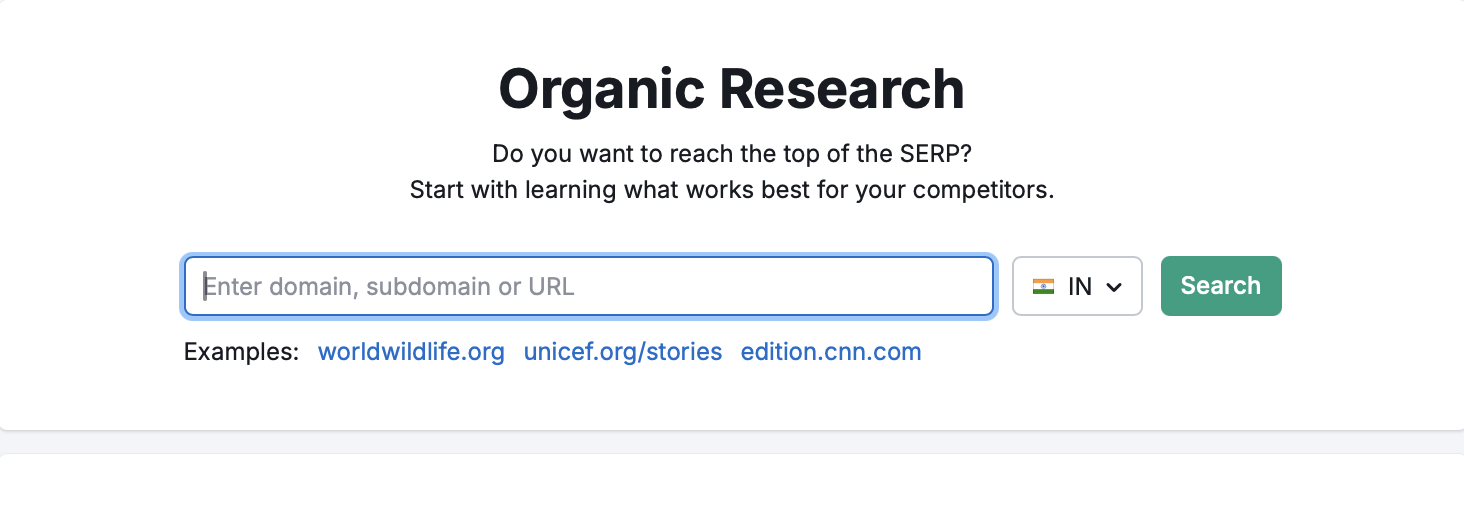
- On the Semrush dashboard, you will find the “Organic Research” tab, where you can check a competitor’s keywords and visibility.
- Select the competitor’s domain and choose the target location. Click on the “Search” button.
- You will get a dashboard containing total keywords, top keywords, keywords by intent, traffic, branded traffic, and non-branded traffic.
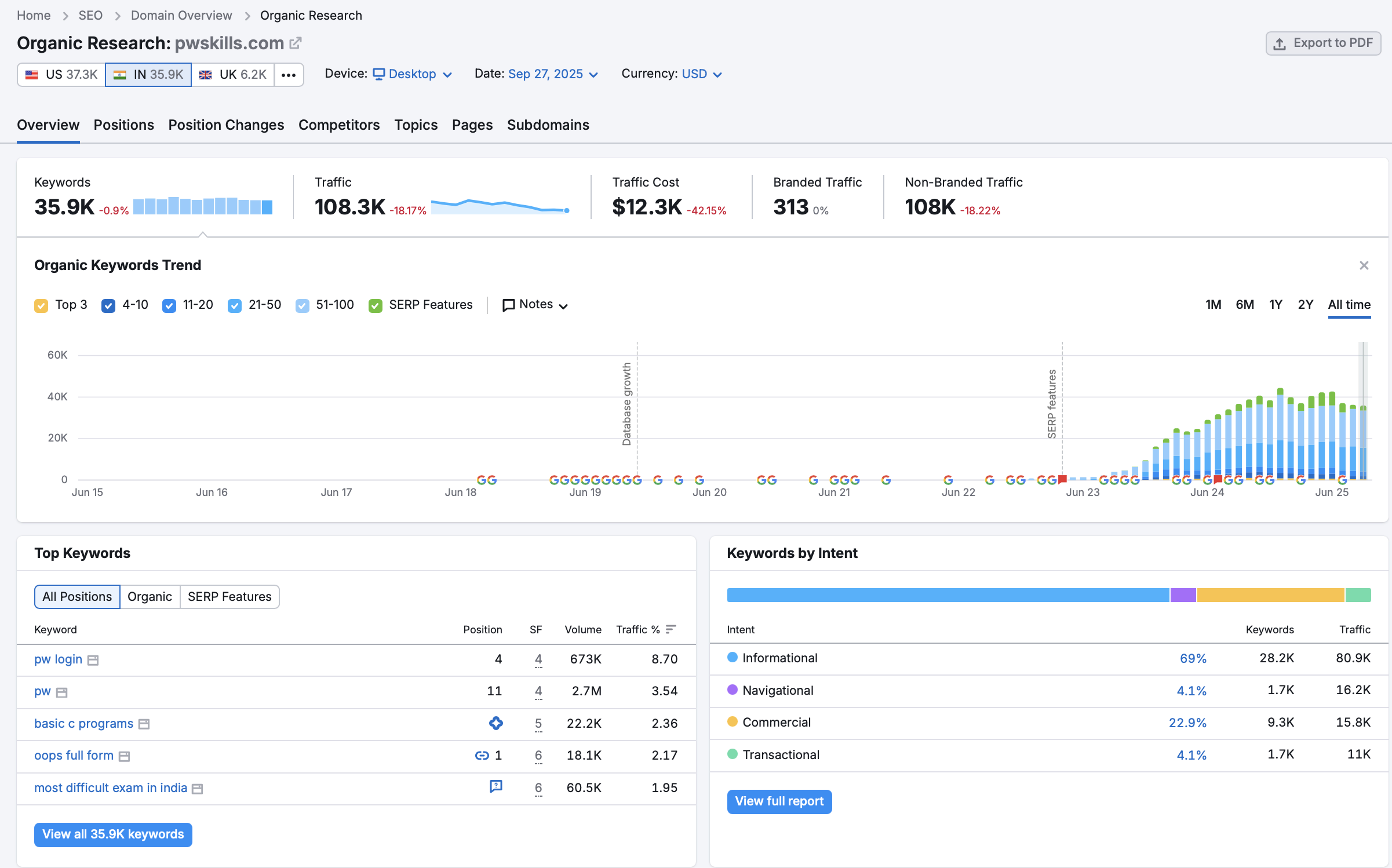
- You can select here “View all keywords” to check all the top keywords used by your competitors.
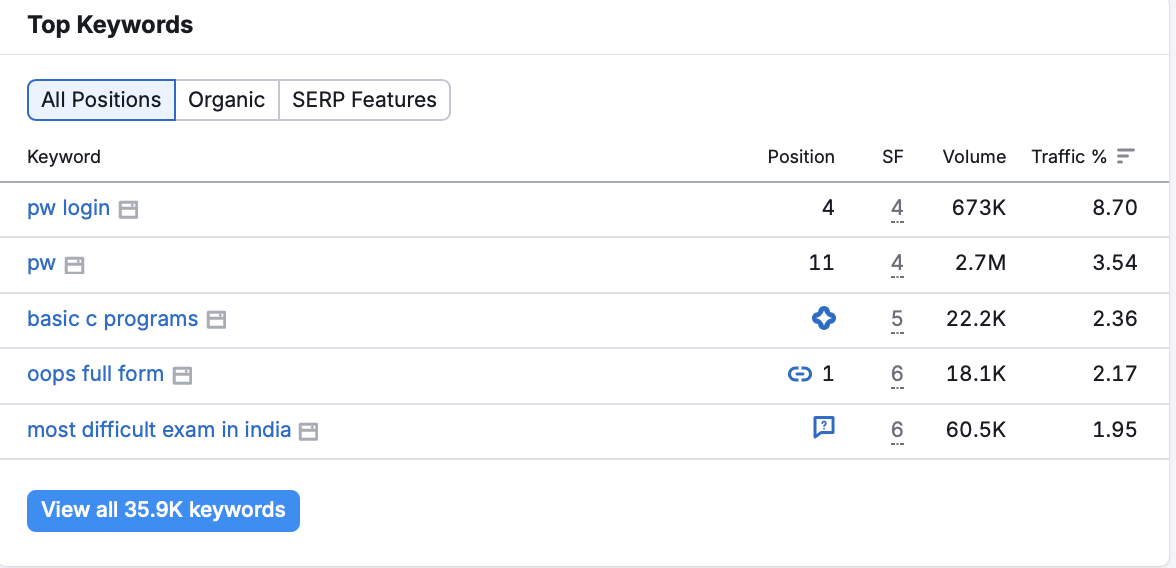
- You can check metrics like position, SF, search volume, traffic percentage, and more.
- You can find the “Keyword Difficulty” in a column that tells how competitive a keyword is to rank on the SERP.
Paid Keyword Competition on Google Keyword Planner
You can also check keyword competiton for paid campaigns or even organic search using the Google keyword planner feature. Check the steps below.
- Step 1: Open the “Google Keyword Planner” dashboard. You will see an interface like this, given below.
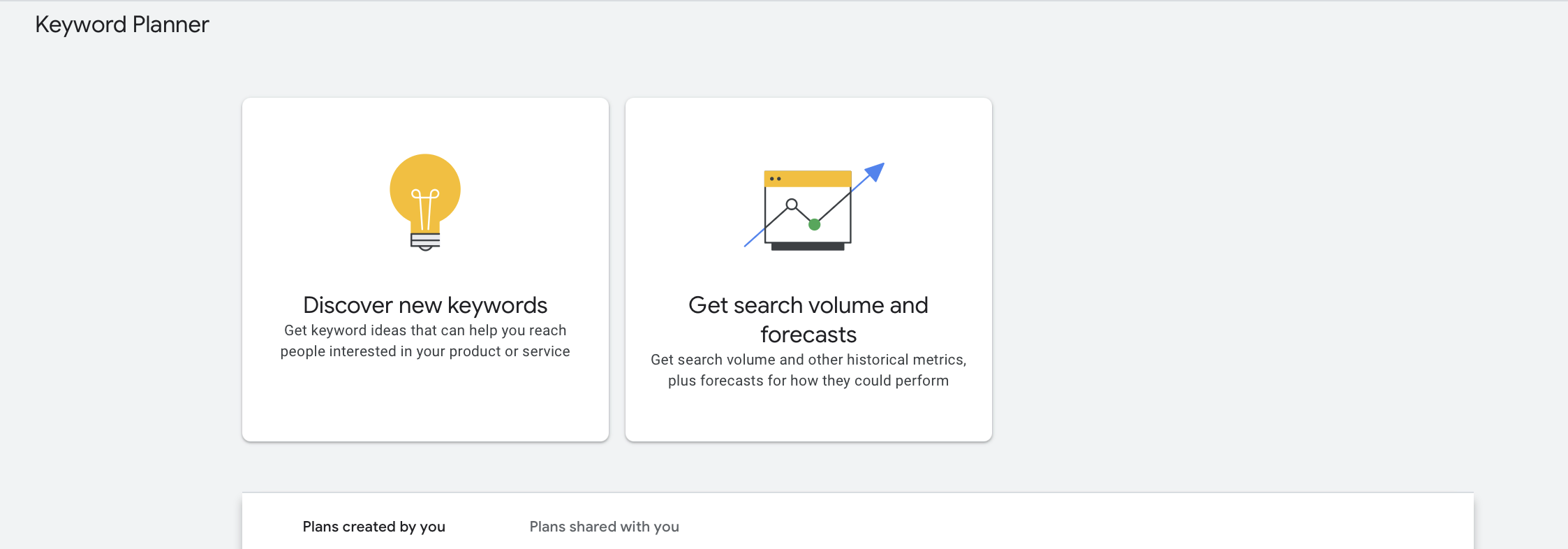
- Step 2: Now, select “Discover new keywords” to target keywords of your choice and check competition on those keywords along with other metrics.
- Step 3: You can check keyword competition along with average monthly searches, three-month change, YoY change, Competition, ad impression share, page bid, and more.
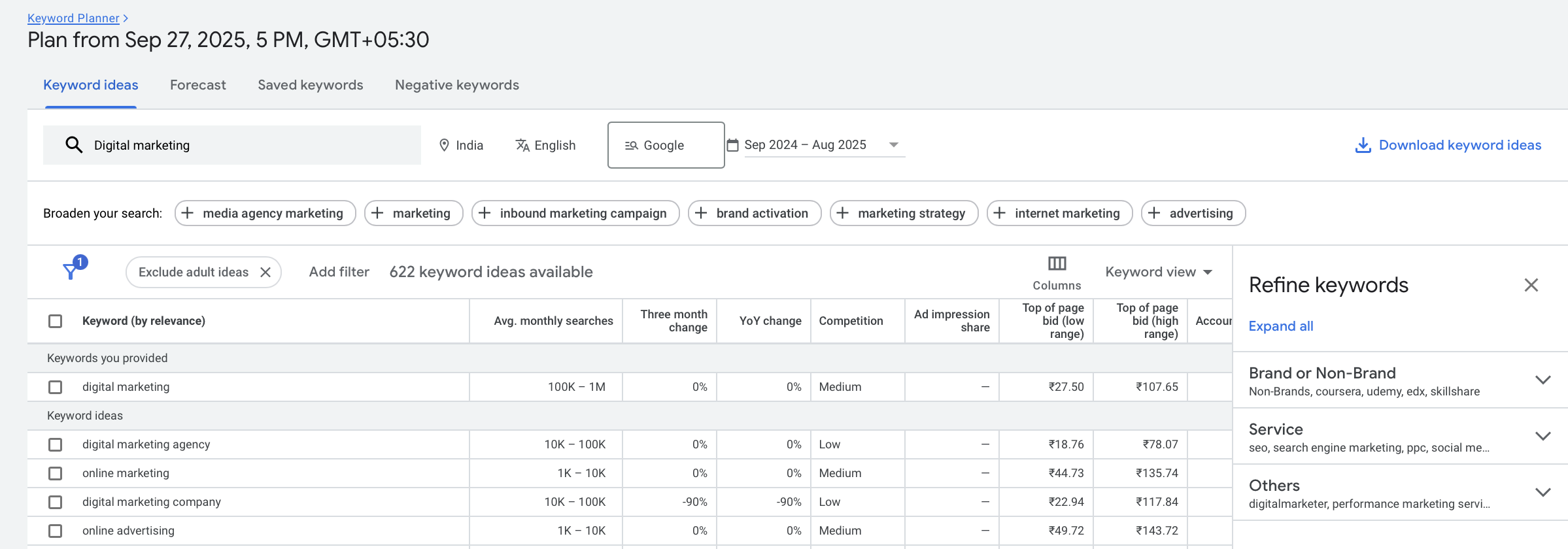
- Step 4: You can collect insights for your target keyword and choose if you think you can deliver quality articles capable of ranking on that keyword.
Read More: What is Keyword Proximity? How to Implement Keyword Proximity For SEO In 2025?
How to Choose the Best Keywords For Your Content?
The type of keywords you should choose for your content depends on various factors and is different for beginners and expert domains. However, everyone wants to target high search volume keywords, but certain things must be kept in mind while moving ahead.
1. Long Tail Keywords
The long tail keywords are more specific keywords related to the content you want to target. These keywords do have comparatively less search volume, but these phrases can deliver a higher conversion rate.
Long tail keywords are often used to get specific information for a query based on a niche. For example, a user might be searching for “which is the best digital marketing institute in Noida” that definitely delivers more targeted results on the SERPs.
2. Short Tail Keywords With Low Search Volume
There are keywords with lower search volume and less competiton which can be targeted for quick ranking. When a keyword has less search volume but is very familiar to your target audience. You can use these keywords to cover content that might gain users’ attention for specific queries, giving you a fair share of traffic and engagement.
3. Evergreen Keywords
These keywords are phrases that are not seasonal, having consistent search volume throughout the year. Well, these keywords depend on the niche of the category you want to target and are distinct, helping you gain traffic and engagement from the group of audience you want. You can easily search for these evergreen keywords using SEO tools available online.
All In One Digital Marketing Course with PW Skills
Build strong aspects of digital marketing skills along with the complete knoweldge of digital marketing with all in one Digital Marketing Course offered by PW Skills. This course will take you through the latest curriculum based on industry practices along with real world projects, practice exercises, and more.
If you are someone who is looking to build their career in various roles in digital marketing, then this course is all you need. No matter if you are a job seeker, a working professional looking for a switch, or an entrepreneur longing for knowledge.
Looking for More?
- Get industry-led live sessions with professionals in digital marketing
- Build a fully job-optimised project portfolio which demonstrates your skills, and strengthen it with projects.
- Get opportunities for full-time jobs or freelance clients for different digital marketing tasks.
- Build freelance copywriting skills with our dedicated mentors and interactive contents
- Get personalised career assistance to prepare for interviews and land your dream job
- Get industry recognised certifications from PW Skills
- Enhance your job readiness with practical skills and expert career guidance.
Keyword Competition FAQs
Q1. What is keyword competition?
Ans: Keyword competition is used to measure the difficulty of ranking a keyword on Google SERPs. It depends on various factors, with backlink profile and domain authority being the top major factors for keyword competition.
Q2. Who uses keyword competition?
Ans: Keyword competition is a metric of SEO that is analysed by digital marketing professionals to find out the level of effort they have to put in to rank on the given keyword.
Q3. What is Cost Per Click?
Ans: The Cost Per Click or CPC is the estimated cost per click for the keyword phrase based on historical paid search data.
Q4. How to see how competitive a keyword is?
Ans: You can check for keyword competition by looking at the search engine result pages. When many sites, including high authority sites having good backlink profiles, are competing for the same keyword phrase, then ranking for those keywords might be difficult. It is important that you analyse your website with your competitors before covering content.

